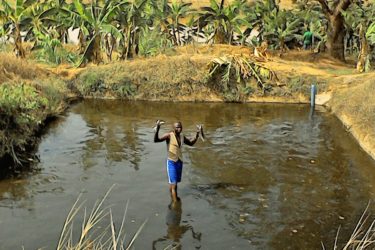Can fish farming eliminate poverty?
Blessing Katambe was on her way to find out. With the financial support from the Chancellor’s fund, she travelled to Nigeria and stayed there for two months.
 Data collection for her research was fun. She learnt a lot and gained more experience working with the farmers in her chosen area (the Federal Capital Territory (FCT) Abuja). She visited 82 fish farms and administered 120 questionnaires. She managed to interview three policy makers in the agricultural sector, but unfortunately, a strike during her stay prevented her from interviewing heads of departments of agriculture in the local councils.
Data collection for her research was fun. She learnt a lot and gained more experience working with the farmers in her chosen area (the Federal Capital Territory (FCT) Abuja). She visited 82 fish farms and administered 120 questionnaires. She managed to interview three policy makers in the agricultural sector, but unfortunately, a strike during her stay prevented her from interviewing heads of departments of agriculture in the local councils.
Fish farming has offered employment to many individuals, and in some cases acting as a second source of income to many conventional farmers and office workers. These farmers carry out their day to day activities with enthusiasm in the midst of many challenges. Cultured fish has improved the protein intake of locals in the FCT, supplementing other traditional sources of protein.
“Coming face-to-face with fish farmers offered me the opportunity to learn about the benefits and problems farmers face on a daily basis. I am grateful to the Chancellor’s fund for this opportunity.”
However, it became evidently clear during her interactions with these farmers that they have many challenges that hinder their farming activities. Some notable problems that were emphasised by almost all the farmers that she visited were: high cost of feed, as most of the high-quality feed is imported from overseas; lack of capital as many financial institutions refuse to lend to small-scale farmers without any collateral; lack of support from government as government grants that are promised to the farmers sometimes are not paid; marketing issues as farmers are sometimes not able to sell their produce after harvest and with lack of processing and storage facilities, post-harvest losses have become a challenge; water availability as water becomes a major problem during the dry season making it impossible for farmers to practice.
Besides all these hurdles, Blessing’s research has confirmed her belief that with support from the government and various agencies, the fish farming industry in the FCT has a great future in producing enough fish food to alleviate poverty and provide stable food supply to the populace.
